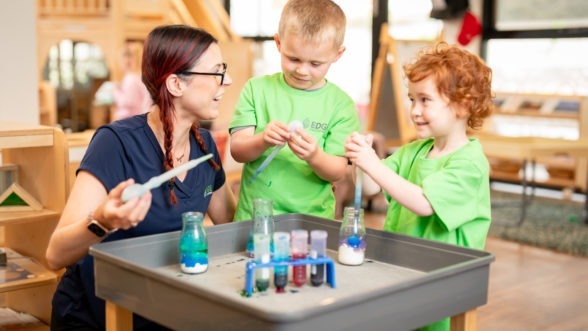
Education, Top News
Education
15 September, 2025

As educators, we know that children learn best through play-based and hands-on experiences, and that there are lasting academic and social gains involved when children are involved in the co-design of their own learning pathways. Therefore, it is important that play is joyful, meaningful, actively engaging, iterative and socially interactive (UNICEF, 2018), so that children are active participants who develop position dispositions toward learning.
According to The Early Years Learning Framework (DEEWR, 2009), play-based learning is where children discover their world and make sense of what’s going on around them as they participate in active engagement with people, places and things. Close your eyes for a moment and reflect upon your own childhood, thinking about what types of play you remember the most fondly. Who were the people, the places, and the types of experiences you engaged with, that provided you with these opportunities for learning?
This nationally recognised framework (DEEWR, 2009) supports Early Childhood Educators throughout Australia to plan and provide children in the early years with a vast amount of play-based learning opportunities and refers to play as a context for learning. In play, children can express themselves and share their uniqueness, they can explore their own curiosities and creativity, and develop relationships, which enables them to try new things and make connections with what they already know (DEEWR, 2009).
Early Childhood Educators use their knowledge of The Early Years Learning Framework (DEEWR, 2009), to identify, analyse and interpret children’s learning through play, and then use what they learn about children individually, or as a group, to inform future planning. Therefore, play is not to be dismissed as a waste of time, but seen rather as an important occasion, where invaluable insight can be gained into how children’s learning and thinking might shape the future.
The theme for Early Learning Matters Week 2022 (17-21 October) is ‘learning through play’. It aims to raise awareness and understanding of the importance of early learning and the difference the profession makes in the importance of learning through play. Find out more!
 Meet the Author
Meet the Author
Samantha Campbell is one of our Program and Practice Managers, who has a strong dedication toward improving literacy and numeracy outcomes for children in the early years. Through ongoing research, she believes her life’s journey is to build the capacity of early years educators, inspiring a new generation of passion-filled leaders for the future.
References:
Department of Education, Employment and Workplace Relations. (DEEWR). (2009). The Early Years Learning Framework for Australia, Belonging, being, becoming. https://www.acecqa.gov.au/sites/default/files/201802/belonging_being_and_becoming_the_early_years_learning_framework_for_australia.pdf
United Nations Children’s Fund (UNICEF). (2018). Learning through play: Strengthening learning. New York, New York: UNICEF. https://www.unicef.org/sites/default/files/2018-12/UNICEF-Lego-Foundation-Learning-through-Play.pdf